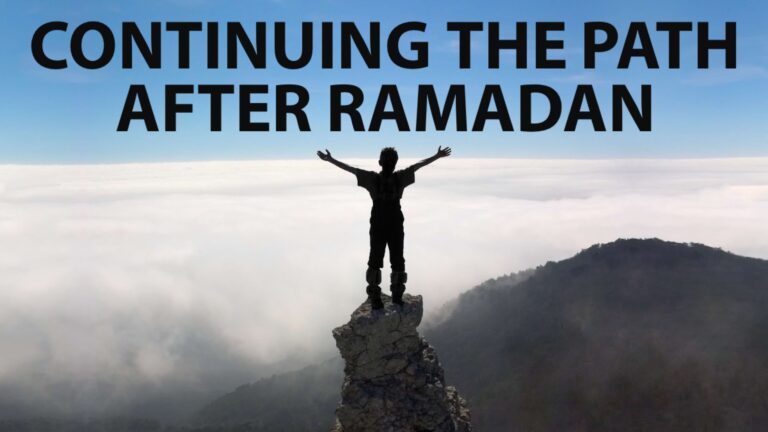By Adil Salahi
God has charged the Muslim community with the task of conveying His message, as preached by the long line of noble prophets and brought to its fullness by Prophet Muhammad (peace be upon him).
It has to make the divine message known to mankind, calling on them to implement it in real life.
Such an implementation ensures the creation of a perfectly happy human society, free of all social oppression and exploitation of one class by another.
The Muslim community is likely to encounter much opposition as it attempts to fulfill its task and deliver the divine message.
Normally, the opposition is mounted by those who have vested interests in maintaining the status quo.
For this reason, the Muslim community launches a campaign of struggle to remove this opposition in order to allow people to listen to God’s message and make their free choice of whether to accept or reject it.
As Islam adopts a positive attitude to all aspects of life, its campaign of struggle adopts all necessary means to ensure success. Obviously, the Muslim community needs a great deal of preparation and training in order to be able to launch a campaign of struggle.
Fasting is the cornerstone of this training. It is only natural that fasting should be ordained for the Muslim community in order to help it fulfill its mission.
Fasting is the best area where firm resolve and strong willpower are truly demonstrated. It also shows the essence of man’s relation with God, which is a relation based on total submission and complete obedience by man.
Fasting is also a symbol of man’s rising above all needs of his body and willingly enduring their pressures in order to win God’s pleasure.
All these are very important elements in the training of the Muslim community so that it will be able to overcome the hardships it may come to face.
The route mapped for this noble community is a thorny one, full of hardships, while all sorts of pleasures and temptations beckon the travelers along this route from the sidelines calling them to change their course and abandon their message.
Mustafa Al-Rafi`i, a leading Arab writer who lived in the early part of the twentieth century describes the month of Ramadan as a 30-day school.
It is a very apt description because our fasting month is indeed a highly advanced school with an annual course lasting 30 days. It is a practical course, which equips the participants for their very important task and provides them with the necessary training to overcome the difficulties that lie ahead.
When we fast we learn to resist our most important needs: food, drink and sex. During the fasting time, which lasts from dawn to dusk, we may not have any of these.
Thus, the needs of our basic instincts of survival are kept in check. We are speaking here of the survival of the individual, for which food and drink are absolutely necessary, and the survival of the human kind, which is ensured through the satisfaction of the sexual desire. When we are able to control these, other needs are easier to control.
To help us in this task, God attaches great reward to fasting. In a sacred Hadith, the Prophet (peace be upon him) quotes God as saying: “All actions a human being does are done for his own sake, except fasting which is done for My sake. I will reward it accordingly.” (Al-Bukhari and Muslim)
We know that good actions are rewarded by God at a minimum of ten times their value, but this could rise to 700 times their value, or even higher. The Hadith refers to this and promises an even higher and richer reward.
It should always be remembered, however, that Muslims do not consider the reward they get from God as the motivator for their actions. Their prime motive is to do what God bids them to do, for this is the way in which they give credence to their claims to be believers.
Anyone who claims to be a believer but does not act on the basis of his faith, implement its requirements or fulfill its duties is not truly a believer, because his actions do not confirm his claims.
Al-Hasan Al-Basri (a renowned Muslim scholar) defines sound faith as that “which is deeply rooted in one’s heart and to which credence is given by action.” Thus, action is most important. Fasting is an action by abstention, which overcomes basic needs and desires. Hence it testifies strongly to one’s faith.
Moreover, fasting is very beneficial to one’s health. It enables the body to have a very welcome rest which helps it to function better through the rest of the year.
It is important to note the health benefits of fasting, but it is even more important to avoid making the mistake of attributing such a great act of worship to its apparent health advantages only and to claim that the purpose of fasting is to improve the physical or mental health of the Muslim community.
We may, however, take note that what God imposes on us as a duty also serves our own needs for a continued, prosperous existence on this earth. God imposes on us only what benefits us and helps us to fulfill our mission. He has no interest in causing us any affliction or hardship.
Thus, although fasting yields some important health benefits, these benefits are a secondary product. The main purpose of fasting which, as the Quran states, was also imposed on former communities of believers in earlier divine religions, is to help us to be more conscious of God and more obedient to Him so that we may be able to deliver His message to the world at large.
_____________________
Source: arabnews.com
[opic_orginalurl]




